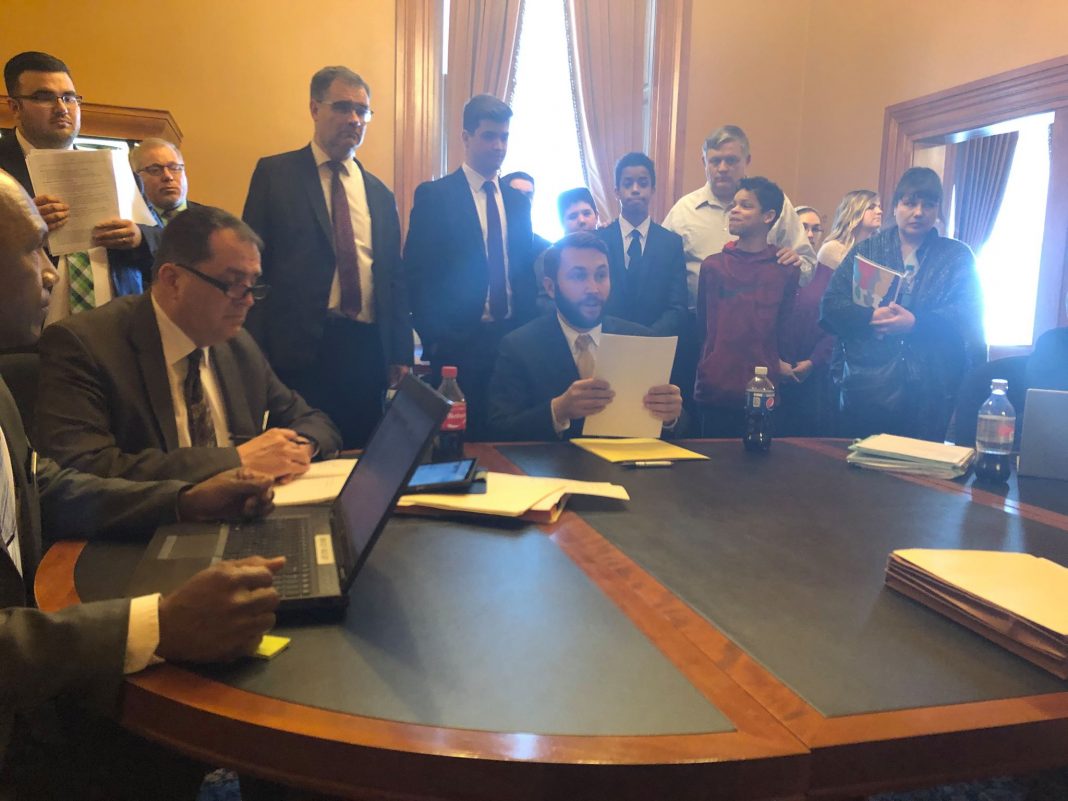A bill to punish pornography distributors remained in limbo after Tuesday’s subcommittee. The bill allows private right of action against a pornography distributor who knowingly allows a minor to access its internet site.
“Right now internet pornography is very easy to access, especially for minors,” said Rep. Sandy Salmon (R-Janesville), who filed the bill. “This bill gives an incentive to make pornography of all kinds harder to access. Pornography fuels demand for human trafficking. This bill will help dampen the demand for pornography and thus the demand for human trafficking. It also fuels a variety of sex crimes, such as sexual assault, incest, sex abuse and sex trafficking. Thus, it creates victims that are hurt and damaged.”
Salmon said accessible pornography has created a public health and mental health crisis.
“This bill provides incentives for attorneys to take on cases where minors have gained access to pornography on the internet,” Salmon said.
Websites would be required to verify someone’s age with a photo ID. A plaintiff only has to prove access to a distributor’s website that contains pornography. They do not have to prove that they saw pornography.
“Obscenity is not speech and not protected by the First Amendment,” Salmon said. “Who thinks pornography is a good idea for families and children to have easy access to? Nobody.”
Greg Baker spoke in support of the bill, representing the Chruch Ambassador Network through The FAMiLY Leader.
“We’ve been doing a lot of work broadly in the area of pornography,” he said. “Pornography has changed a great deal in the last 20 years, largely just because the technology has changed.”
Smartphones have made accessing pornography much easier, especially for kids. Baker said some studies show minors as young as eight have accessed pornography. Baker said viewing pornography once, twice or three times may be a choice, but eventually, it serves as an addiction.
Baker said he recalled government efforts to warn teens about the dangers of smoking when he was growing up. Viewing porn unintentionally once has the capability of turning into a lifelong habit, he added.
Pastor Brad Cranston testified for the bill. He said he supports doing anything that could help make accessing pornography more difficult for kids.
A lobbyist representing the motion picture association said the group would want to address some definitions within the bill.
Brad Epperly of the Newspapers and Broadcaster Association said he appreciates the intent but is concerned with language including a description.
Daniel Zeno of the ACLU said the group opposes any restraints on the right to create, publish or distribute materials to adults. While the bill is about minors, Zeno said the result will be limiting access for adults because the only way a website can work is by having the provisions to verify age.
Craig Patterson of the Iowa Library Association said he shares some of the concerns. He said he believes the legislature could error on the side of parents really having those conversations with kids and making decisions on a family basis rather than putting something into code that may create unintended consequences.
Daniel Sunne of The FAMiLY Leader said anyone who disseminates obscene materials to minors is already guilty of a public offense in Iowa in existing code that applies to print materials.
“We’re taking the intent of Iowa Code and applying it to a potential loophole online where Iowa code might be a little behind the times,” he said. “This is a narrow law that only applies to Iowa-based websites.”
Tamara Scott testified on behalf of Iowa Faith and Freedom as well as Concerned Women for America.
“We applaud any effort to protect our children,” Scott said. “Pornography is a public health crisis. The numbers of children that are being groomed by watching pornography, whether they’re exploited or used in trafficking, increase greatly.”
Scott referenced 22 studies from seven countries that found pornography is associated in an increase in verbal and physical aggression among both males and females.
Chuck Hurley, representing The FAMiLY Leader, said the legislature dealt with cleaning up the child obscenity laws in the 90s when he was chair of Judiciary. He referred to a historic statement he had read from the fourth century that says we will always have sexual prostitution and other things that are problematic for society.
“We’re always going to have that. We can’t eradicate it,” he said. “What we can do, and what legislators should try to do, is to zone it the best we can.”
Hurley compared the crisis to a city dealing with sewage. Every city, he said, will have sewage, but the city has to channel the sewage so it creates the least amount of sepsis possible.
“With the internet, we have the abusive obscenity that his so rampant now, it’s open sewage on the internet,” Hurley said. “I don’t envy you trying to find a way to channel this or zone it. It’s a tough job, but I would challenge you to find those ways to challenge it because the less open sewage we have, the fewer young people are going to be harmed by it.”
Rep. Ross Wilburn (D-Ames) said he is worried about unintended consequences. He brought up instances where minors are researching certain medical conditions and view graphic images.
Those concerns, though, shouldn’t apply as court precedent provides the SLAPS test. It means work won’t be defined as obscenity unless it lacks serious literary, artistic, political or scientific value.
Rep. Bobby Kaufmann (R-Iowa City) said he wants to avoid unintended consequences.
“This is obviously an extremely critical topic,” Kaufmann said. “Clearly there’s a problem, no question. So, this is important to me. I’m going to take this under advisement and learn from this today before I make a final decision. But, I think this is a topic that is clearly important enough that it deserves further conversation beyond today.”
The subcommittee was composed of Representatives Michael Bergan (R-Dorchester), Kaufmann and Wilburn.











